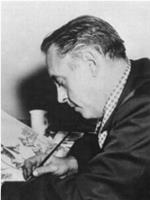弗兰克·塔许林 Frank Tashlin

- 性别:男
- 星座:双鱼座
- 出生日期:1913-02-19
- 出生地:美国,新泽西州,威霍克
- 职业:导演 / 编剧 / 制片人
- 更多外文名:Francis Fredrick von Taschlein (本名) / Tish (昵称)
弗兰克·塔许林简介
影人资料
Tashlin drifted from *** to *** after dropping out of high school in New Jersey at age 13. In 1930, he started working for Paul Terry as a cartoonist on the Aesop's Film Fables ******* series, then worked briefly for Amadee J. Van Beuren, but he was just as much a drifter in his animation career as he had been as a teenager.Tashlin joined Leon Schlesinger's ******* studio at Warner Bros. as an animator in 1933, where he was noted as a fast animator. He used his free time to start his own comic strip in 1934 called Van Boring, inspired by former **** Van Beuren, which ran for three years. He signed his comic strip "Tish Tash," and used the same name for his ******* credits (at the time it was considered extremely unprofessional to use anything except one's birth name among animators, but Tashlin was able to get away with this due to the anti-Germanic feelings of that era). Tashlin was fired from the studio when he refused to give Schlesinger a cut of his comic strip revenues. He joined the Ub Iwerks studio in 1934. He moved to Hal Roach's studio in 1935 as a writer.He returned to Schlesinger in 1936 as an animation director, where his diverse interest and knowledge of the industry brought a new understanding of camerawork to the Warners directors."Afterward, he served as production ******* at Columbia Pictures' Screen Gems animation studio in 1941. He effectively ran the studio and hired many former Disney staffers who had left as a result of the Disney animators' strike. He launched The Fox and the Crow series, one of the better products of the studio. He was fired over an argument with the executives of Columbia.Tashlin moved on from animation in 1946 to become a gag writer for the Marx Brothers, Lucille Ball, and others, and as a screenwriter for stars such as Bob Hope and Red Skelton. His live-action films still echo elements of his animation background; Tashlin peppered them with unlikely sight gags, breakneck pacing, and unexpected plot twists.
